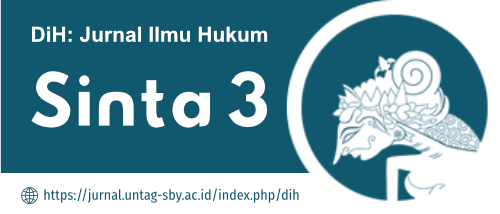FUNGSI LEGISLASI DALAM SISTEM PEMERINTAHAN PRESIDENSIL (Studi Perbandingan Indonesia dan Amerika Serikat)
DOI:
https://doi.org/10.30996/dih.v9i18.275Abstract
-Downloads
References
Alwasilah, C. 1993. Sosiologi Bahasa. Bandung: Angkasa.
Ayatrohaedi. 1985. Bahasa Sunda di Cirebon. Jakarta: PN Balai Pustaka.
Chambers, J. K., & Peter Trudgill. 1980. Dialectology. Cambridge: University Press.
Danie, J. Akun. 1982. Kajian Geografi Dialek di Minahasa Timur. Jakarta: PN Balai Pustaka.
----. 1991. Kajian Geografi Dialek di Minahasa Timur Laut. Jakarta: PN Balai Pustaka.
----. 1998. Geografi Dialek Bahasa Sangir. Jakarta: Pusat Pembinaan dan Pengembangan Bahasa.
Dubois, Jean, dkk. 1973. Dictionnaire de Linguistique. Paris: Larousse.
Francis, W. N. 1983. Dialect Border and Linguistic System. Di dalam Proceedings of The Ninth International Congress of Linguists Cambridge, Mass. August 27-31, 1962:109-114.
Goosens J. 1977. Inleiding tot de Nederlands Dialectologie, Tweede druk. Groningen: Wolters-Noorhoff.
Grijns. 1976.Beberapa Segi Dialektologi Umum. Tugu Bogor: P3B Depdikbud.
Guiter, Hendri. 1973. “Atlas et Frontoere Linguistiqueâ€, Orf: 61--109.
Keraf, G. 1984. Linguistik Bandingan Nusantara. Jakarta: Gramedia.
Koentjaraningrat. 1980. Pengantar Ilmu Antropologi. Jakarta: Aksara Baru.
Kurath, Hans. 1972. Studies in Area Linguistics. Bloomingtoon: Indiana Univ. Press.
Lalamentik W. H. C. M., M. Salea, J. A. Danie, L. Kembuan, R. Terok, dan J. Makalew Palar. 1986. Geografi Dialek Bahasa Tombulu. Jakarta: Pusat Pembinaan dan Pengembangan Bahasa.
Lauder M. R. M. T, Ayatrohaedi, F. A. Datang, H. Lapoliwa, B. Aritonang, F. Feirizal, Sugiyono, N. Martis, W. Kurniawati, dan H. Astar. 2000. Penelitian Kekerabatan dan Pemetaan Bahasa-Bahasa Daerah di Indonesia: Propinsi Sulawesi Tengah. Jakarta: Pusat Pembinaan dan Pengembangan Bahasa.
Moeliono, Anton M. 1985. Pengembangan dan Pembinaan Bahasa, Ancangan Alternatif di dalam Perencanaan Bahasa. Jakarta: Penerbit Djambatan.
Orton, Harold dan Eugen Dieth. 1962. Survey of English Dialect. Leeds: E. J. Arnold & Son Limited.
Petyt, K. M. 1980. The Study of Dialect: An Introduction to Dialectology. Worcester and London: The Trinity Press.
Pop, Server. 1950. La Dialectologie: Apercu Historique et Methodes d’enquetes Linguistique. Lovvian-Gembloux: Duculot.
Revier, Xavier. 1973. “L’Incidence Maximale du Fait Dialectalâ€, Les Dialectes Romans de France. Paris: Central National de la Recherche Scientifique. No. 930: 43-59.
Trudgill, Peter. 1986. Dialects in Contact. Oxford: Basil Blackwell.
Seguy, Jean. 1973. “La Dialectometrie dans l’Atlas Linguistique de la Gascogneâ€, Revue e Linguistique Romane. Vol. 37: 1-24.
Sudaryanto, 1993. Metode dan Aneka Teknik Analisa Dara. Yogyakarta: Duta Wacana University Press.
Swadesh, Morris. 1971. The Origin and Diversification of Language. London: Routiedge & Kegan.
Wakelin, Martyn F. 1977. English Dialect: An Introduction. Edisi revisi. London: The Athlone Press of the University of London.
Weijnen, A. 1966. Nederlandse Dialectkunde, Tweede druk. Assen: Van Gorcum & Comp. N. V.
Weinreich, U. 1954. Is a Structure Dialectology Possible?. Dalam Word X (2—3): 388-400.
Zulaeha, Ida. 2010. Dialektologi: Dialek Geografi & Dialek Sosial. Yogyakarta: Graha Ilmu.
Downloads
Published
Issue
Section
License
Authors who publish with DiH: Jurnal Ilmu Hukum agree to the following terms:
- Authors transfer the copyright and grant the journal right of first publication with the work simultaneously licensed under a CC BY-SA 4.0 that allows others to share the work with an acknowledgement of the work's authorship and initial publication in this journal.
- Authors are able to enter into separate, additional contractual arrangements for the non-exclusive distribution of the journal's published version of the work (e.g., post it to an institutional repository or publish it in a book), with an acknowledgement of its initial publication in this journal.
- Authors are permitted and encouraged to post their work online (e.g., in institutional repositories or on their website) prior to and during the submission process, as it can lead to productive exchanges, as well as earlier and greater citation of published work (See The Effect of Open Access)










